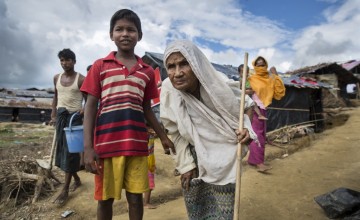
Read our 2023 annual report

Knowledge Hub
Concern Worldwide treating severly malnourished Rohingya children
Concern Worldwide, Ireland’s largest humanitarian aid agency, has today confirmed it is treating Rohingya refugee children for severe acute malnutrition and fears diarrhoea and other water-borne diseases could break out if sanitation needs aren’t urgently met.

- Fears outbreak of diarrhoea and water-borne diseases could risk lives of vulnerable children
- Emergency teams ‘running out of options’ to develop adequate sanitation facilities
An estimated 509,000 Rohingya people have fled Rakhine state in Myanmar and crossed the border into the Cox’s Bazar area of Bangladesh since the latest outbreak of violence on August 25.
Concern is currently providing 48,000 Rohingya refugees with food rations and providing more than 100,000 refugees - mainly children, adolescents as well as pregnant and lactating women - with nutrition services as new arrivals continue to flood into the region.
Two Concern Nutrition Support Centres have been established in Moynadhona and Hakim Para areas with team members treating seriously-ill children with around seven per cent so far showing signs of severe acute malnutrition.
Damian Seal, Emergency Programme Manager said:
Community outreach screening teams are reaching between 100 and 150 households a day per camp. Malnutrition cases are averaging around seven per cent, many of whom have been referred for in-patient treatment at nearby health facilities. One little girl we saw, who was about three or four years old, was half her weight and looked very ill. It’s appalling to see little children suffering in this way.
In Cox’s Bazar there is very limited space to develop any sort of sustainable water and sanitation structures. The people have set up their shelters so close together that it’s nearly impossible to be able to engineer any facilities close to them. You have close to 500,000 people moving into the Cox’s Bazar area, a district once inhabited by a population of 400,000 people so you can only imagine the implications in terms of space and solutions left for developing water and sanitation facilities.
Mr Seal said space for sanitation is the biggest challenge and emergency response teams are "running out of options" and he fears vulnerable children are at risk of contracting life-threatening diarrhoea.
“If there is an outbreak of water related disease, it’s life-threatening for these children as their immune systems cannot fight back. These children have limited access to immediate medical facilities, they are extremely vulnerable to getting infections from dirty water and poor sanitation,” he said.
There are limited places where people can go to the toilet safely, there are limited numbers of latrines and there is no drainage management in place to dispose of human waste so even if we had latrines, the infrastructure needs to be in place for them to work properly. This is extremely worrying because the threat of water-borne diseases is substantial and if the cyclone seasons hits this area significantly, the impact to the community could be devastating so we hope more land will be allocated soon because we are running out of options.
Concern’s Regional Director for the Middle East and Asia, Brid Kennedy, said much more funding is required to prevent the Rohingya refugee crisis from escalating further.
“Humanitarian organisations need around €370m over the next six months to help up to 1.2 million people, many of them children, who need life-saving help. The Rohingya population, particularly the children, is highly vulnerable and our teams on the ground are already seeing children in very vulnerable conditions.
Following the initial response, Concern plan to develop more facilities and to ensure the health of children and other vulnerable people does not deteriorate. These people have suffered immense trauma and many face a grim future if they don’t receive adequate assistance,” she said.
For more information or interviews please contact Kevin Jenkinson on 086 358 2886 or kevin.jenkinson@concern.net.
Other ways to help
Corporate support
Is your company interested in working together for a common cause?
Fundraise for Concern
From mountain trekking to marathon running, cake sales to table quizzes, there are lots of ways you can support our work.
Buy a gift
With an extensive range of alternative gifts, we have something to suit everybody.
Leave a gift in your will
Leave the world a better place with a life-changing legacy.
Volunteer with Concern
The lots of ways to get involved with our work as a volunteer
School fundraising
Without the generous support from schools, we wouldn't be able to do the work that we do.




